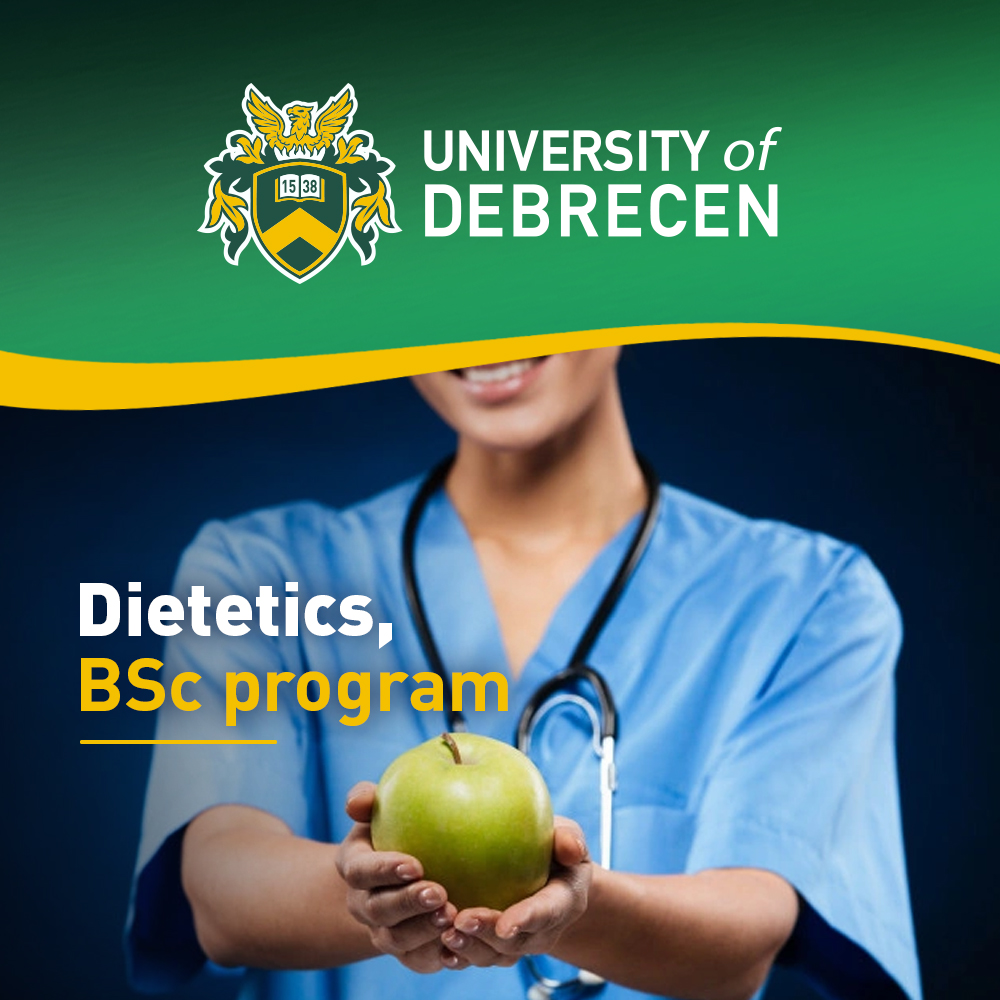For Prospective Students
For Current Students
About UD
Practical Info and Contacts

Faculty: Health Sciences
Academic discipline: Medical and Health Sciences
Qualification: Dietitian
Starting date: September
Language requirements: English language proficiency (CEFR level B2, assessed at the compulsory entrance interview)
Academic requirements: high school certificate; entrance interview
Duration: 8 semesters
ECTS credits: 240
Tuition fee: 6,000 USD/year
Other fees: application fee 150 USD, entrance procedure fee 350 USD
Short description:
The degree covers the impact nutrition has regarding the function of the human body in health and disease. It provides professional knowledge and skills to prevent, treat and manage poor health with food, nutrients and dietary change. After the successful completion of this program, you, as a qualified dietitian, will be able to use your knowledge to work with people by promoting healthy lifestyle, optimizing health, managing and preventing diet-related diseases. Dietitians are the only qualified health professionals who assess, diagnose, treat and prevent diet and nutrition problems. The aim of this program is to enable you to use your proficiency to promote a healthy lifestyle and offer nutrition advice. You will be able to interpret the latest nutrition science results into more comprehendible, practical information about diets and healthy eating. Furthermore, you will be able to help people to manage their health and nutrition-related diseases. Once you have successfully completed this program, you will gain a comprehensive view of the mental and physical aspects of nutrition, helping people overcome the barriers hindering behavioural change. As a dietitian you will be guided to acquire communicational and professional skills in order to became an effective health care professional, serving people in need by improving and maintaining people's quality of life and health.
Lecture, seminar: 61%
Practice: 39%
Main subjects typically include (this list is indicative and may change):
| Year | Main subjects |
| 1 | Applied Health Sciences I, Anatomy, General Principles in Nursing and Clinical Propedeutics, Introduction to basics of biostatistics, Health Informatics I., Food Chemistry, Basics of physiotherapy, Roger’s Conversation, Physical Education I., Applied Health Sciences II., General Principles in Nursing and Clinical, Propedeutics – summer practice, Basics of Dietetics, Health Informatics II., Engineering of Food Plants, Properties of food raw materials, Food Hygiene, Physiology I., Basics of epidemiology, Communication, Basics of quality management, Physical Education II. |
| 2 | Basics of Psychology, Professional Hungarian Language I., Physiology II., First Aid, Food Processing Technologies I., Introduction to law, Basics of Clinical Dietetics, Microbiology I., Work and fire safety regulations Public health medicine I., Medical Latin, Elective subjects, Professional Hungarian Language II., Dietetics I., Principles of Health Sciences, Catering Systems of Health Institutions, Health Care Law, Food Technology, Food Processing Technologies II., Food Processing Technologies II. – Block practice, Microbiology II., Public Health Medicine II., Public Health Medicine II. – Block practice, Psychological and Addictological Knowledge |
| 3 | Basics of Pedagogy, Basics of Sociology, Dietetics II., Dietetics II. – Block practice, Catering Management I., Food Processing Technologies III., Philosophy, Economics and Management, Pharmacology, Preventive Medicine & Public Health I., Public Health Medicine III., Public Health Medicine III. – Block practice, Bioethics, Dietetics III., Dietetics III. – Block practice, Thesis I. - Basics of Research Methodology, Health Sociology, Catering Management II., Preventive Medicine & Public Health II., Public Health Medicine IV., Public Health Medicine IV. – Block practice, Nutritional Psychology, Field practice I. (1 week in internal medicine department, 1 week in food plants) – Summer practice, Elective subjects |
| 4 | Dietary knowledge, Thesis II., Health Promotion in Primary Care, Health Promotion in Primary Care – Block practice, Catering Management III., Catering Management III. – Block practice, Food Safety, Foodstuff regulations, Household Economics, Communal Catering, Basics of Sport Dietetics, Nutritional Health and Epidemiology, Health Policy, Cardiopulmonary Resuscitation (CPR), Field practice II. (1 week in internal medicine clinic), Field practice III. (6 weeks at a surgical clinic and other clinics), Thesis III., Elective subjects |
Internship, practice: The duration of the internship is at least 16 weeks.
Career prospects: Health care institutions, educational institution in the field of health, university departments, institutes, research centers, food and feed companies or research companies and institutes, food office and civil organizations.
Check out some information about the Application and Admission process!
More info about Accommodation and Cost of living are also available on our website.
But if you still have any question, feel free to contact us!
You can also meet our Student Ambassadors, check their testimonials or even contact them in case of non-academic questions, eg. about student life.